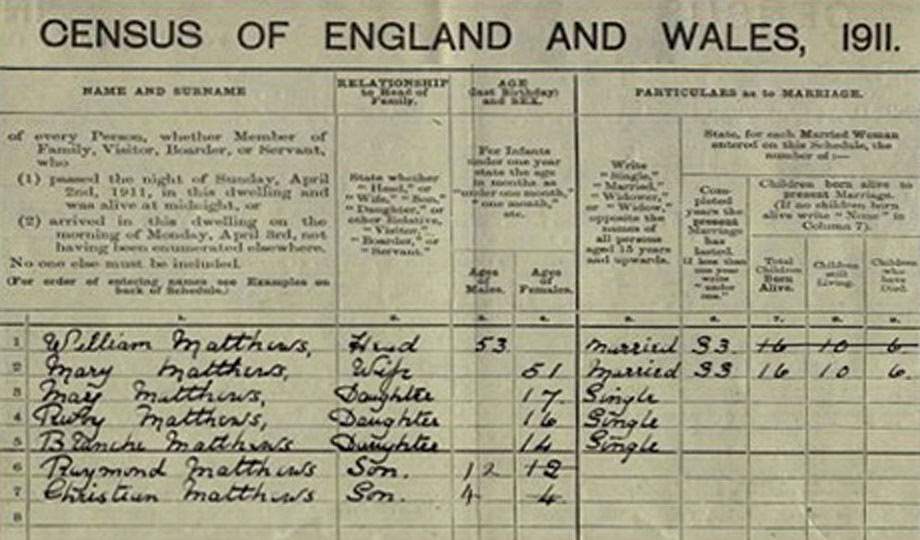March 2021
Census 2021
Sunday 21st March 2021
I was talking to a very enthusiastic local history group researcher recently when we were discussing the release date of the 1921 census. This census was taken on Sunday 19 June 1921 and will be published in January 2022 exactly 100 years after the end of 1921 as originally promised in 1921. This will be released in digitised form on the major family research websites, after the 100 year rule that people were promised when it was compiled i.e. individual details not released for 100 years.
June 1921 was a warm and Sunny month in England with unusual temperature extremes. There was no measurable rain at all in parts of Wiltshire all month. 31C was recorded on the 17th, and then 32C in Manchester on the 25th. I cannot find any records of the temperature in Bremhill parish. 1921 was also the year that the Irish War of Independence ended, paving the way for the creation of the Irish Free State and Northern Ireland as we know it today. Herr Adolf Hitler became head of the newly formed 'National Socialist German Workers Party', and Sweden abolished the Death Penalty.
The census results endorsed the social changes after WWI with a pandemic (Spanish Flu) running rife for the previous 3 years and killing millions across the world. The census results were compiled into 28,000 bound volumes of original household returns containing detailed information on close to 38 million individuals then living in the UK and some living abroad in the “British Empire”.
The 1921 census is the most comprehensive census to be opened to the public since records began in 1801. The present format however dates from 1841. In 1921 for the first time “divorced” was included as a marital status. Other additional information includes the address of each person’s place of work was recorded. This means that when we eventually see them, we will be able to find the colleagues of our relatives for the first time. This was also the first census since the creation of the RAF from the RFC. Overseas air bases, army bases and ships of the Royal Navy were included.
The facts within the census have provided valuable information to the planners of the country and the questions asked vary each decade. 2021 will be no exception but might be the last in the present format and will use digital input as far as is possible rather than an enumerator walking from door to door and sometimes across the footpaths as in past years. As usual, it is very important that we take part. Our information helps build a picture of where you live that will be used to decide how vital services are planned and funded not just across the UK. These include things like schools, doctors’ surgeries, hospitals and libraries. I just wonder if it will be analysed enough and in time to influence the future Chippenham plans.
This year will ask about relationships, type of property, any shared rooms, number of bedrooms, type of heating, owned or rented and how many cars are available. On a personal basis there will be many questions that reflect our changing times ranging from your type of partnership, country of birth, ethnic group, religion and your physical and mental health and your exact date of birth, which has only appeared before in the brief 1939 register.
For recent historians the census has provided valuable information on our understanding of our more recent history and indeed population growth.

This can be seen in the 1911 census where how long you had been married and how many children had been born were asked. The blacksmith at Foxham, William Matthews married Mary Stokes in 1878 and by the time of the 1911 census.
William was 53 years of age and Mary was 51 years. During the marriage they had 16 children sadly 6 of these, including twins, had died by the time of the census and are buried in the churchyard at Foxham.

The Matthews Family in 1908
The 1921 census will be the last we can view in detail for several years until the release of the 1951 census in 2052, a bit late for many of us. The 1931 census for England and Wales was destroyed by accidental fire during the Second World War and not by enemy action as many suppose and no census was taken in 1941 due to WW2.
In September 1939 however a register as mentioned above, rather than a census was taken which currently provides the most complete survey of the population of England and Wales between 1921 and 1951, making it an invaluable resource for family, social and local historian.
Information from the 2011 Census has already been crucial in our understanding of mortality for different groups during the pandemic, for example, to understand deaths by ethnicity, religion and disability status, and is the only source of local-level information on occupation and household composition.
With fresh data from 2021, it will be able to update the analysis we have already done and use it alongside new data sources to give us a better understanding of life today hopefully post pandemic.
